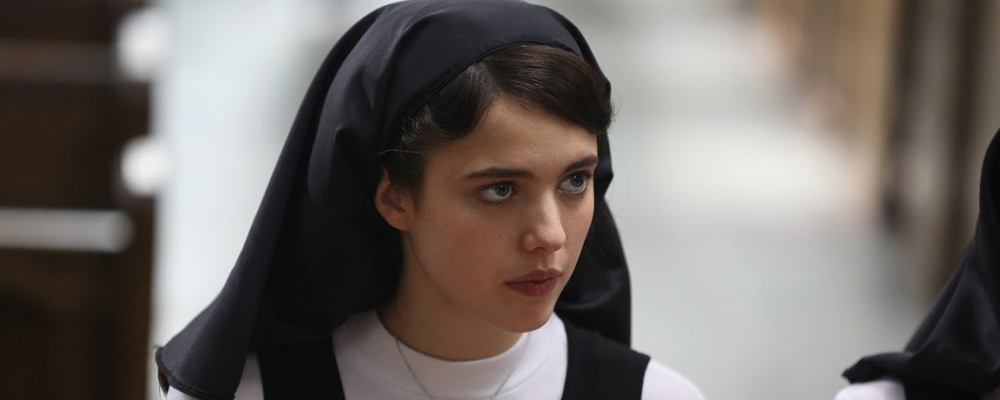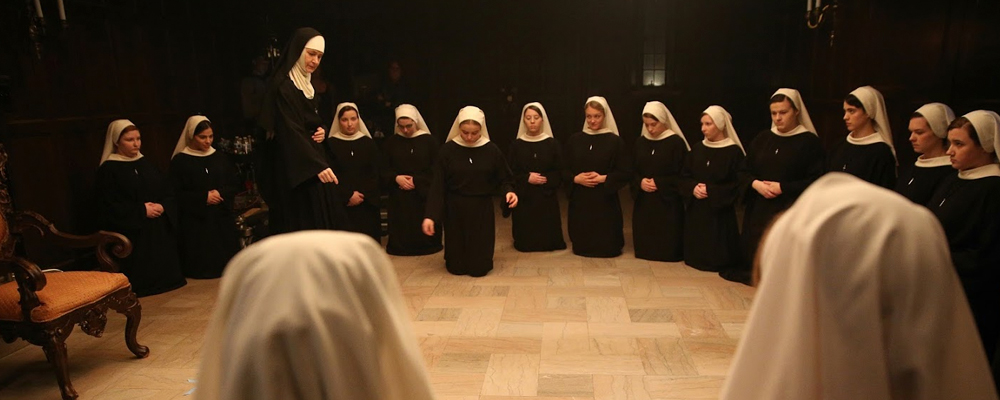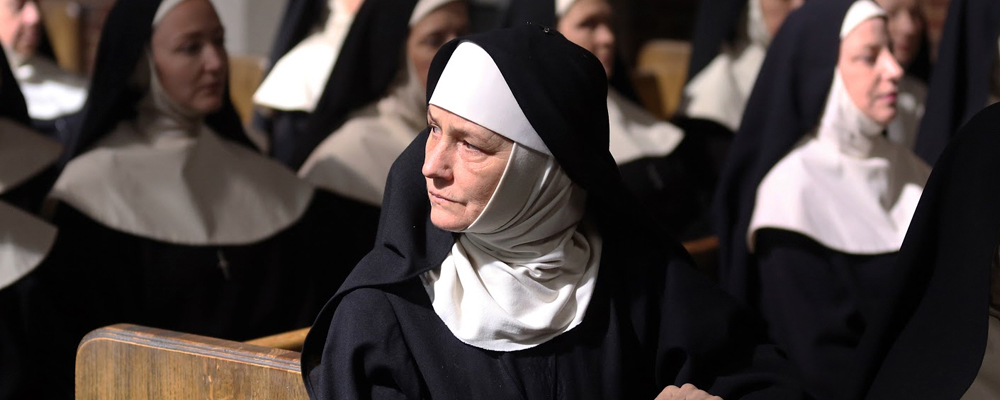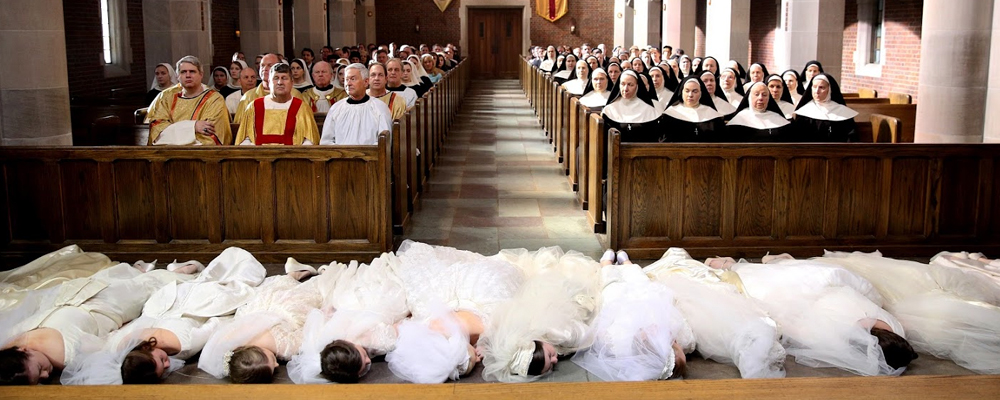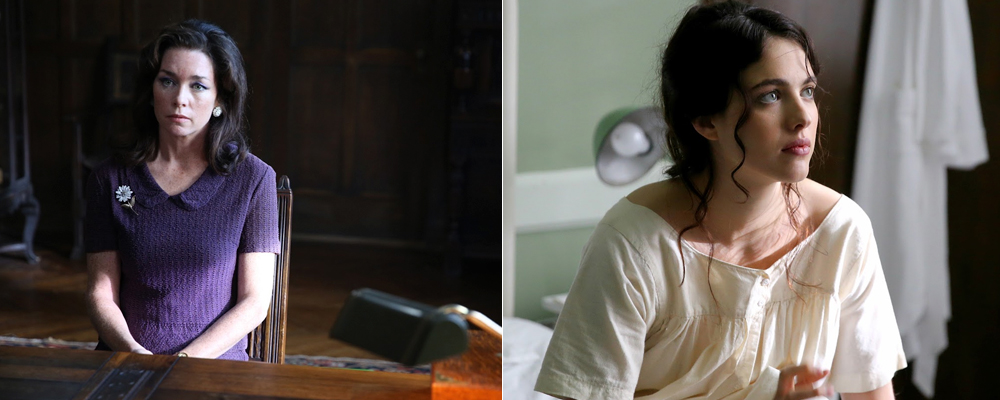Actress Margaret Qualley and Director Maggie Betts Take Us Inside the Convent With ‘Novitiate’
Sandra Miska
Few worlds have been quite so intriguing to outsiders than that of cloistered nuns. For hundreds of years, much of their ways had been mysterious to Catholics and non-Catholics alike, until a movement in the Church in the early 1960s that became known as Vatican II brought these religious women out into the glaring light, ready they were ready for it or not. For her first narrative feature, filmmaker Maggie Betts immersed herself in this world to create “Novitiate,” a compelling drama about a young woman in rural Tennessee, Cathleen (Margaret Qualley), who seeks a life in a convent following a turbulent childhood with an unstable mother (a brilliant Julianne Nicholson). Set in the late 1950s and early 1960s, “Novitiate” brings to light the struggles aspiring nuns, especially during this particular period of time, faced, both externally and internally. The title refers to the 18-month period during which a nun becomes a novice following temporary vows. At the end, she must decide if she wants and is able to commit to a life in a convent, a commitment that includes sacrificing all physical affection and almost all of the outside world.
Both Betts and Qualley sat down with Entertainment Voice to discuss their journey in making “Novitiate.” Neither women identifies as being religious, but rather were attracted by the idea of a non-traditional love story involving a higher power.
Betts explained her inspiration in making a film that explores what it means to be in love with God. “About six or seven years ago, I happened to pick up this book on Mother Teresa, of all people, that was about her love relationship with God, and they way the relationship was described was so intensely romantic, and also torturous and painful and enduring, and it was just this great, great love affair. I didn’t know before that that nuns had this level of intensity.”
“I read the script and I found it super touching and beautiful, and I was eager to meet with Maggie, and then instantly upon meeting Maggie I felt really connected to her. I wanted to do the movie really bad, but I also had this strange sense that I had to, if that makes sense,” recalled Qualley. “ It was a good excuse to learn about Catholicism and read the Bible for the first time. I was excited to see what it would be like to be a nun.”
“Novitiate” explores the various motivations young woman during this time period had for aspiring to becomes a bride of Christ. Many grew up in religious homes, but Cathleen is an exception, as her non-religious mother takes her to church out of a sense of duty, later enrolling her in Catholic school after she is offered a scholarship. While her peers find themselves becoming interested in boys, Cathleen finds herself falling more and more for God and a religious life, a calling that would ostensibly lead to a more peaceful and stable world than the one she was raised in.
Once she enters a convent as a 17-year-old postulate, Cathleen meets the other young woman, all bright-eyed, but some more steadfast than the others. Reasons for entering the convent range from being a product of a large Catholic family during a time when it was common for parents to “donate” a child to the Church, to being inspired by Audrey Hepburn in “The Nun’s Story.”
Betts explained how she found inspiration in these fictional characters. “I would take elements from books or movies or documentaries that I read or saw and things that I liked that I just thought would work….” Many nuns who left during Vatican II went on to write memoirs, books that were devoured by Betts during her research. “I tracked down a couple of the authors. There was one woman, this woman named Deborah Larsen, who wrote a book called ‘The Tulip of the Pope’ that was particularly influential.”
As it is revealed in the end credits of “Novitiate,” Vatican II led to a mass exodus of some 90,000 nuns. “On the surface, the large majority left because they felt smacked in the face by the Church reducing their status and taking away their relevance within the Church,” explained Betts. “But then also there were a lot who were at that moment like, ‘I don’t know how much more of this I can really realistically take,’ and then Vatican II [gave them an excuse].”
An example of the latter in the film is the character of Sister Mary Grace (Dianna Agron), a kind and gentle young nun who acts as a big sister to Cathleen and the other postulates, as well as serves as a foil to the more severe, traditional Reverend Mother (Melissa Leo). Agron takes her career to the next level as this conflicted young woman who beneath her sweet exterior is questioning her surroundings, particularly the Reverend Mother who seeks to keep Vatican II a secret from the women as long as possible.
While most of the rest of the Church is rapidly changing, the strict, almost sadistic Reverend Mother clings to relics of the past, even keeping a rope whip known as “the discipline,” which she hands over to the nuns to use on themselves as a form of penance.
Qualley’s recalled how her commitment to these discipline scenes led to some extra time in the make-up trailer, as she used both a real whip on herself when she could have used a dummy one. “It seemed like it was a good idea, because I wouldn’t have to act, I could just see what it was like, I guess, but the next day my back was covered in black and blue bruises and I had welts,” she recalled.
Qualley, along with her co-stars, also employed less painful methods for getting into character, including living with the other actresses in a convent-life atmosphere that included dining in silence and giving up their gadgets. “I’ll always remember those nights during which we abided by all the rules that our characters would have had to,” she recalled. “It was interesting to be having dinner together but not speaking at all or using our cell phones or watching TV or listening to any music or anything, just removing all of those stimulates that are ever-present in our lives on a day-to-day basis. It makes you focus on things that you [normally wouldn’t]. It was very magical.”
Did Qualley learn anything about herself while playing Cathleen? “I think I am a spiritual person… I think it definitely gave me an opportunity to kind of think [about] what that means to me and try to become in tune with whatever that is.”
A highlight of “Novitiate” is definitely Leo’s character, as she plays such a complex character, a woman steeped in tradition who, at the same time, questions male dominance in the Church.
“She’s so forceful,” said Betts of Leo. “She’s astounding. You kind of sit behind the monitor and you don’t know what’s going to happen. On the one hand, she’s very a very raw, in-the-moment actor who’s just present and just going to let it happen, but then there’s another part of herself that you feel like is two steps ahead and just kind of guiding the dialogue. She’s very, very skillful at the same time as being very raw. It’s crazy to watch what she does sometimes, because it’s, like, the last thing that you expected, but often incredibly brilliant, so it was inspiring for me.”
Added Qualley, “It was a honor to be able to work with her, and I was definitely intimidated, which I think probably helped our onscreen dynamic, but in actuality, she was really giving and amazing to work with.”
“Novitiate” has an open ending that leaves the viewer wondering whether or not Cathleen took her final vows, a decision that both women felt made for a more powerful finale. “I like the idea of the audience being able to wonder,” said Betts.
Betts, who up until now is best known for her AIDS documentary “The Carrier,” explained what she learned as a documentarian that she carried over into her making a narrative feature.
“I shot probably 30 or 40 percent more than I knew was ever going to end up in the movie with full awareness, but that’s because with my documentary, I shot 180 hours,” she explained “I edited that movie for a year, and it ended up 83 minutes. My first rough cut for this movie was three hours and 23 minutes, and some people were like, ‘Oh my God! What are you going to do?’ But I was like, ‘Calm down. I’ve been down this road before. I like having a lot of material, and I learned that from the documentary.” Research was also a major part of the process this time around. “Unlike a documentary, then I threw a lot of it out for the sake of attempting to make a really good, dramatic mythical story, as opposed to a real story.”
Next up for Qualley, she can been seen in the upcoming independent features “Strange But True” and “Io.” She also just wrapped “Adam,” a film about the LGBT community, and is currently filming the thriller-drama. “Donnybrook.”
Although she is tight-lipped about any specific details, Betts did reveal that she is currently in the process of developing a few more projects featuring strong female leads. “They deal with the same idea of female characters almost in a David and Goliath situation facing up against an institution or a nation that’s been trying to hold them back.”
“Novitiate” opens Oct. 27 in Los Angeles and New York with a national release to follow.

